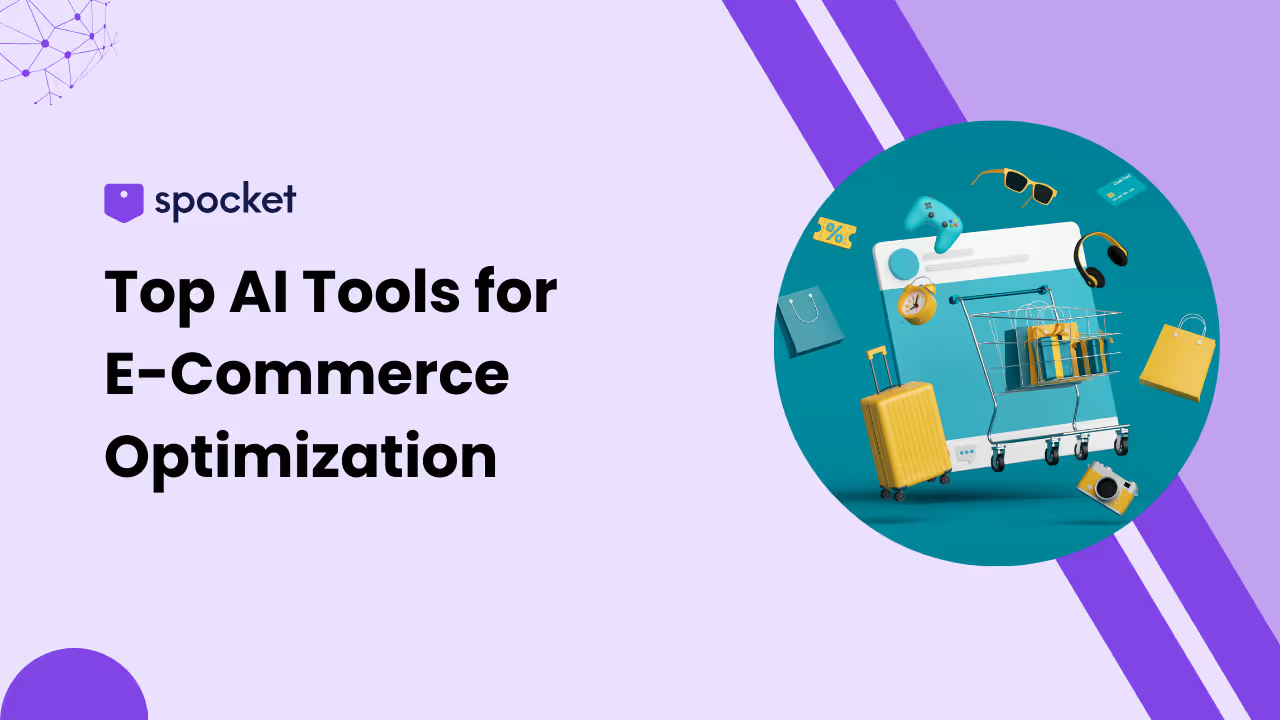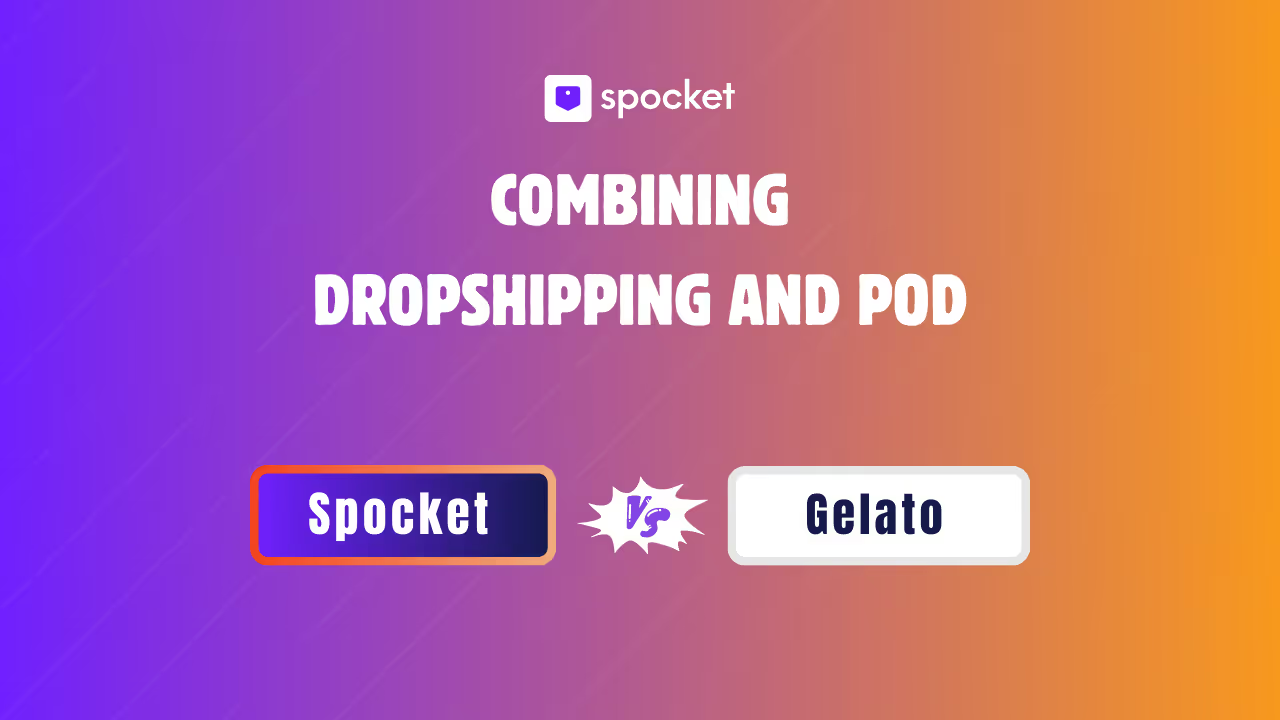Top AI Tools for E-Commerce Optimization
Discover top AI tools for e-commerce optimization in 2024 to boost sales, enhance customer service, and streamline inventory management for increased efficiency and revenue.


Artificial intelligence (AI) has emerged as a major changer, providing strong tools for improving different areas of internet enterprises. AI tools are altering the way e-commerce works, from personalized shopping experiences and predictive analytics to inventory management and customer support.
This blog will look at how you can use AI to improve your e-commerce strategy. We'll look at AI's practical uses, including as chatbots for customer service, recommendation engines for tailored marketing, and AI-driven analytics for better decision making.
Whether you're an experienced e-commerce expert or just getting started, understanding and utilizing AI tools can drastically improve your efficiency, customer pleasure, and, ultimately, your bottom line. Join us as we explore the amazing potential that AI brings to the e-commerce industry. Let’s get started
Why use Artificial Intelligence in E-commerce?
Artificial Intelligence has become essential part of our life. The role of AI is increasing significantly in across all sectors. By 2032, the global AI in retail market is expected to increase at an annual rate of 18.45% to reach $45.74 billion. AI can help you significantly optimize and boost your e-commerce business. Here are some of the top reasons why you should use AI in your e-commerce business:
Personalized Shopping Experience
AI analyzes customer data to determine preferences and habits, enabling for more personalized product recommendations. AI-powered systems may dynamically update website content based on individual user behavior, making the purchasing experience more relevant and interactive.
Predictive Analytics
AI can forecast future demand for products based on past data, seasonal trends, and market analysis, allowing firms to better manage inventory. Predictive analytics can foresee customer behavior, allowing organizations to modify their marketing campaigns and increase conversion rates.
Enhanced Customer Service
AI-powered chatbots deliver fast customer service, swiftly handling typical concerns and difficulties while increasing customer satisfaction. AI systems may work around the clock, guaranteeing that clients receive support and help at all times. Underlying these AI systems are what are intelligent agents, working tirelessly to analyze, respond and adapt to customer interactions for optimal satisfaction round the clock.
Increased Sales and Revenue
Artificial intelligence (AI) can greatly boost e-commerce sales and revenue by streamlining numerous business processes. AI algorithms use user behavior, preferences, and purchase history to make personalized product suggestions, similar to strategies implemented by Vengreso to enhance digital sales growth. This can raise the average order value and encourage repeat purchases. By recommending complimentary or higher-end products, AI can persuade clients to purchase additional items or select premium alternatives.
Enhanced User Experience
AI-powered recommendation engines suggest products that customers are likely to be interested in, hence enhancing cross-sell and upsell chances. AI-powered virtual assistants can make it easier for users to browse websites, find products, and make purchases.
Enhanced Fraud Detection and Prevention
AI systems may monitor transactions in real time to detect suspicious behavior and potential fraud, thereby protecting both the company and its customers. Artificial intelligence can detect patterns and abnormalities that may suggest fraudulent behavior, allowing for proactive loss prevention measures.
Price Optimization
AI algorithms can alter prices in real time based on demand, competition, and other factors, thereby increasing profitability. AI can provide individualized discounts and prices to specific customers based on their purchasing history and behavior.
Improved Search Functionality
Traditional search bars can be limited. AI understands natural language processing, allowing clients to explain their needs more casually. AI may also evaluate massive volumes of product data to suggest related or complimentary things, helping buyers to a more satisfying purchase.
Efficient Marketing
Traditional web advertising can take a scattershot approach. AI may evaluate client data to determine which demographics and interests are most relevant for personalized advertising efforts. AI analyzes client data to provide highly focused marketing campaigns, which improves the effectiveness of promotional activities. AI algorithms can optimize online marketing by identifying the most relevant audience segments, modifying bids, and selecting the optimal ad placement platforms. This guarantees that firms reach the correct audience with their message, resulting in a higher return on investment (ROI).
Inventory Management
AI assists in maintaining ideal inventory levels by forecasting demand, eliminating both overstock and stockouts.
AI can improve supply chain procedures by forecasting delays, recommending alternate routes, and managing supplier relationships more effectively.
Reduce Operational Cost
According to Statista, 51% of respondents believe that AI solutions lower business operating costs by more than 20%. Repetitive operations such as order processing, data entry, and customer support inquiries can be automated with AI chatbots and software. This allows human employees to focus on more difficult jobs, increasing overall productivity and lowering labor costs.
Competitive Advantage
In the competitive world of e-commerce, a competitive advantage might mean the difference between booming sales and fighting to stay alive. AI (artificial intelligence) has emerged as a significant tool for e-commerce enterprises, providing a strategic advantage in numerous important areas mentioned above.
Applications of AI in E-commerce
Artificial intelligence has transformed e-commerce by improving several areas of the customer experience and operational efficiency. AI technologies, ranging from personalized suggestions, checking content authenticity to sophisticated fraud detection systems, are critical to fostering growth and innovation in the online retail sector. Here are some of the key applications of AI in e-commerce
Personalized Shopping
Artificial intelligence (AI) algorithms examine user behavior, past purchases, and browsing habits to make personalized product recommendations that boost conversion rates. Research found that 91% of consumers say they are more inclined to make another purchase from the same supplier after receiving seamless and individualized customer care. Mobile apps, email campaigns, websites, and other touchpoints are just a few of the ways you may collect and examine client data when using e-commerce AI technologies like Boomtrain, Granify, and TUP e-Commerce.

Customer Service and Support
Chatbots driven by artificial intelligence (AI) offer immediate customer help by managing routine questions, completing orders, and resolving problems. This enhances customer satisfaction and response times. Chatbots were actively employed by 58% of B2B and 42% of B2C businesses in 2022. 88% of online buyers reported interacting with chatbots at least once, and 69% said they were happy with the experience. Some of the top AI chatbots that offer comprehensive customer care for big businesses are ChatGPT, Zendesk AI, and Dialogflow.

Product Description
AI is transforming how organizations generate product descriptions by automating and improving the writing process. AI can effectively write high-quality, engaging, and SEO-friendly product descriptions by leveraging advanced technologies such as natural language processing (NLP) and machine learning. By inputting important facts, AI can generate coherent and compelling descriptions that highlight each product's unique selling advantages. Artificial intelligence algorithms can improve product descriptions for search engines by combining relevant keywords, meta descriptions, and other SEO best practices. Some of the top product description generators are writesonic, copy.ai, rytr, etc.

E-mail Automation
Artificial intelligence revolutionized email marketing by automating several components of the process, making it more focused and efficient. AI enables the generation of highly personalized email content for particular recipients. AI may provide personalized subject lines, recommendations, and offers that are relevant to each recipient by assessing data such as past behavior, preferences, and purchase history. Top automated e-mail writers are Jasper, copy.ai, writer.com, etc.

Content Creation
AI is making the creation of content for e-commerce more efficient, tailored, and data-driven. AI can help generate blog posts and articles by suggesting topics, creating outlines, and even writing entire pieces based on keyword analysis and content trends. This aids in maintaining a consistent flow of new content. Artificial intelligence algorithms can generate and modify photos and videos for e-commerce sites. This includes creating product photos, promoting films, and designing graphics to improve the visual appeal of the online business. Some of the top AI based content creator tools are ChatGPT, canva, Copysmith, writesonic, etc.

Efficient Search
Voice and visual search technologies are becoming increasingly popular in e-commerce and other industries, offering users simple and intuitive ways to access information and items. AI plays an important role in improving the efficiency and accuracy of these search algorithms. NLP helps AI interpret and process human language. It enables voice search algorithms to understand complex questions, identify diverse accents, and interpret the meaning of spoken words, resulting in more accurate and relevant search results. AI works with AR to improve visual search experiences. Users may see how things appear in real-world settings using smart devices, making the buying experience more dynamic and informative. For example, WooCommerce provides an augmented reality search facility.

Customer Data Analysis and Management
AI systems can evaluate enormous datasets to classify clients based on demographics, behavior, and preferences. This enables organizations to adjust marketing campaigns and personalize client encounters.
Using previous data, AI can forecast customer behavior and patterns. This enables firms to better predict client wants, optimize inventories, and organize marketing campaigns successfully. These activities are only achievable with proper data management. Machine learning contributes to high-quality data management solutions by automating data entry, updates, cleansing, and organizing on a large scale. Efficient enterprise data migration further supports these processes by ensuring that data is seamlessly transferred, integrated, and accessible across systems, enhancing the accuracy and effectiveness of AI-driven insights.
Inventory Management
AI systems use previous sales data, market trends, weather patterns, and other pertinent variables to correctly forecast future demand. This enables organizations to optimize inventory levels, reduce stockouts, and minimize surplus inventory. Artificial intelligence can optimize inventory replenishment by taking into account lead times, supplier capacities, seasonal fluctuations, and economic situations. This guarantees that organizations have adequate stock levels while minimizing carrying expenses. Some of the AI based inventory management tools are Fishbowl, Zoho Inventory, Atera etc.

Social Media Posts and Updates
AI technologies can use trending themes, customer preferences, and historical data to recommend or produce compelling content ideas for social media postings. This comprises text, images, and videos that appeal to the target audience. AI algorithms use data on client behavior, such as when they are most engaged on social media, to plan posts at the best moments. This maximizes each post's reach and engagement. Some of the AI based tools for social media posts and updates are Feedhive, Audisense, Vistasocial, etc.

Top 5 AI Tools in E-commerce
In e-commerce, several AI tools are crucial for enhancing efficiency, improving customer experience, and driving sales. Here are five top AI tools and their uses:
ChatGPT
OpenAI developed ChatGPT, an AI language model that understands and generates human-like text based on input. Here's how to use ChatGPT in e-commerce:
Customer Support: Provides immediate responses to customer inquiries about items, orders, shipping, and refunds, hence boosting response time and satisfaction.
Product Recommendations: Analyzes client preferences and previous interactions to recommend tailored products, hence increasing upselling and cross-selling chances.
FAQ Automation: Automatically responds to frequently asked questions on websites and social media platforms, decreasing support teams' effort and increasing productivity.
Content Generation: Utilizes e-commerce data and trends to create compelling product descriptions, promotional content, and marketing messages.

Jasper AI
Jasper AI is an AI-powered content generation platform that focuses on creating high-quality written content based on user inputs and specifications. Here's how to apply Jasper AI with e-commerce:
Content Creation: Creates product descriptions, blog entries, marketing copy, and social media content fast and efficiently.
SEO optimization: It is the process of creating content that is optimized for search engines by combining relevant keywords and phrases to increase organic search visibility.
Personalization: Customizes content for specific audience segments based on demographics, preferences, and browsing history, increasing engagement and conversion rates.
Content Scaling: Allows businesses to increase content production while maintaining quality, hence supporting campaigns, product launches, and continuing marketing efforts.

Surfer AI
Surfer SEO is a program that employs artificial intelligence to optimize content for search engines. Here's how Surfer AI can be utilized in e-commerce.
Content optimization: involves analyzing top-ranking pages for target keywords and making recommendations to improve content structure, keyword density, and readability.
Competitor Analysis: Determines content gaps and possibilities by analyzing competitors' content strategies and SEO performance.
On-Page SEO: Makes specific recommendations for title tags, meta descriptions, headers, and image alt texts to help enhance on-page SEO aspects.
Keyword Research: Creates keyword recommendations and assesses their competitiveness to uncover high-impact keywords for e-commerce product pages and blog posts.
Performance Tracking: Tracks and reports on keyword ranks, organic traffic patterns, and SEO performance data to assess the effectiveness of SEO campaigns.

Boost.AI
Boost.AI is an AI-powered virtual assistant platform that aims to improve customer interactions and automate support activities. Here's how to use Boost.AI in e-commerce:
Customer Support Automation: Uses a conversational interface to handle customer inquiries, order tracking, refunds, and frequently asked questions, decreasing the strain of human support workers.
Personalized suggestions: Uses consumer data and surfing history to make personalized product suggestions and promotional offers.
Order Assistance: Helps clients place orders, verify product availability, and manage shopping carts in real time.
Feedback Collection: Gathers and analyzes customer feedback to uncover trends, improve product offerings, and increase customer happiness.

Prisync
Prisync is a competitive price intelligence technology that enables e-commerce enterprises to analyze and optimize their pricing strategy. Here's how you can use Prisync:
Competitive Price Monitoring: Monitors and analyzes rival prices in real time across numerous channels and markets.
Price Optimization: Provides information and recommendations for dynamically adjusting prices in response to market developments, rival pricing, and demand swings.
MAP Monitoring: Checks Minimum Advertised Prices (MAP) to guarantee compliance with brand agreements and policies.
Pricing Alert Notifications: Notifies businesses about pricing changes and market developments, allowing them to respond quickly to competitive maneuvers.

Examples of AI use in E-commerce
Here are a few real life examples of the use of AI in e-commerce:
Spocket
Spocket connects online retailers with suppliers who provide dropshipping services. It uses AI to create a dropshipping store in about five minutes. It also uses AI to match suppliers, manage inventories, promote products, and optimize your online business.

Amazon Recommendation System
Amazon utilizes artificial intelligence algorithms to offer products to users based on their browsing history, purchasing habits, and demographic information. This personalized recommendation system increases sales by proposing appropriate items, resulting in higher customer satisfaction and retention.

Alibab Virtual Shopping Assistant (Tmall Genie)
Alibaba's Tmall Genie is an AI-powered virtual assistant that assists consumers with online shopping by making personalized recommendations, answering product-related questions, and facilitating purchases. It improves the purchasing experience by making targeted recommendations and increasing user engagement.

Wayfair's Visual Search and Recommendation Engine
Wayfair, an online furniture and home goods company, uses AI-powered visual search technology to help shoppers identify things by uploading photos or utilizing images from their mobile devices. This technology assists users in discovering visually comparable items and enables faster and more accurate product searches.

AI Tools for E-Commerce Optimization FAQs
How to use AI for e-commerce?
Using AI in e-commerce implies harnessing artificial intelligence technologies to improve different elements of online retail operations, including consumer engagement and business growth. AI is used in perosnalized shopping experience and providing best customer services by analyzing historical data
What is the best AI tool for e-commerce?
There are several of the best AI tools for e-commerce depending on the application. Some of the best AI tools for e-commerce are ChatGPT for content writing, Jasper, and Copy.AI for product description and e-mail generation, canva for image generation, etc.
What are the applications of AI in e-commerce?
There are several applications of AI in e-commerce such as to provide personalized shopping experience, manage inventory, optimizing price, tracking keywords, providing 24/7 customer support, content creation, genertaing product description, providing analytics of user for targeted advertising
Is AI used in Amazon?
Yes AI is used in Amazon's recommendation system, in Alexa shopping, etc.
What are the challenges of using AI in e-commerce?
Implementing AI in e-commerce comes with several challenges:
- Data Privacy and Security
- High Implementation Costs
- Data Quality and Quantity
- Complexity of Integration
- Issue Customer Trust and Acceptance
- Bias and Fairness
- Continuous Learning and Adaptation
- Technical Expertise
- Scalability Issues
Launch your dropshipping business now!
Start free trialRelated blogs

Spocket vs Gelato : Combining Dropshipping and POD
Compare Spocket vs Gelato for combining dropshipping and print on demand. Learn key differences, best use cases, and how to run both models together.

How to Create and Sell Digital Planners on Etsy for Passive Income
Learn how to sell digital planners on Etsy step-by-step. Create, list, price, and scale digital planners for passive income even as a beginner.

How to Use User-Generated Content (UGC) to Explode Your Sales
Learn how to use UGC for ecommerce to boost trust, conversions, and repeat sales with scripts, workflows, rights, and placement tips.


































